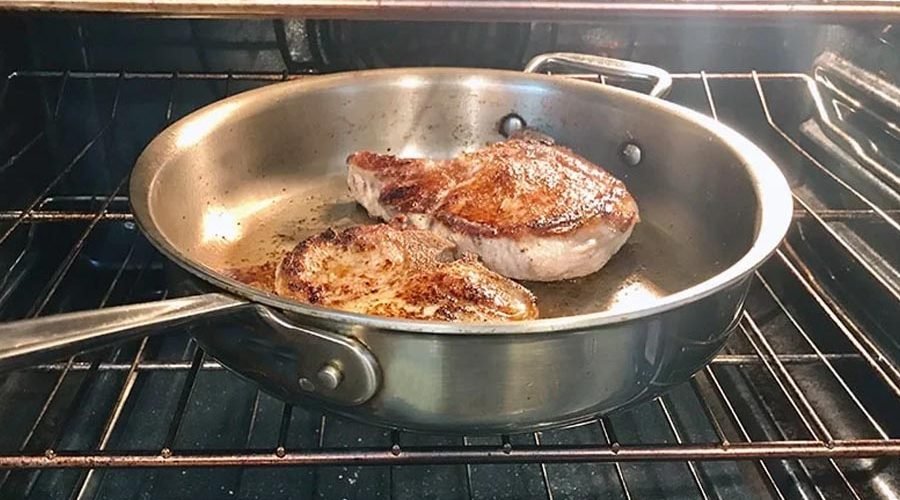Stainless steel is one of the popular materials due to its resistance to dirt, bacteria and corrosion. It is an excellent choice for cookware.
Table of Contents
Is stainless steel cookware oven safe?
The short answer is yes. In general, stainless steel cookware is safe between 400°F and 800°F. Up to 500°F, provided the cookware does not have wooden or plastic handles. These materials melt at high temperatures. For better suitability, please use high-quality stainless steel. More suitable is stainless steel, which does not react with food at high temperatures.
Additionally, the material, thickness, and construction of cookware can affect its maximum oven-safe temperature.
How to tell if your stainless steel pan is oven-friendly
If the pan is made of stainless steel, including the handle, lid, and lid handle, it should be oven safe. Check below to find the oven-safe temperature for your cooker.
Check the bottom of the pot
See User Instructions/Manual
Looking at the package sometimes shows the highest temperature
Go to the manufacturer’s website, such as the Heritage Steel website image above, and search for cookware for details on safe use
Advantages of stainless steel cookware:
Value for money
Cookware made of stainless steel is affordable. However, the real value lies in the durability of the material. With this cookware, you can get years of consistent service from a set or pan.
Highly durable
The stainless steel will still work whether you scratch, scrub, or even knock. Plus, it’s more complicated than copper or aluminum. And it has a high melting point. Therefore, stainless steel is the most durable cookware as compared to other cookware.
Unlike the chip coating of “nonstick” cookware or the stain and rust issues of enamelled and cast iron cookware, stainless steel is your first choice. Your stainless steel cookware will last decades and be passed down from generation to generation.
Excellent cooking performance
Multi-layer stainless steel cookware has excellent cooking capabilities in terms of heat absorption and heat distribution.
This means you shouldn’t have problems cooking meat at uneven temperatures and serving raw food in restaurants!
Stain steel can do wonders whether frying, poaching, braising, roasting, or sautéing.
Quick and easy to clean
With its non-porous, smooth surface, stainless steel cookware is an easy-to-clean product.
Stainless steel is so strong that you can wipe away stains and debris, but remember that a harsh sponge will leave scratches.
Stainless steel pots, pans and utensils can be repeatedly soaked and placed in the dishwasher without damaging the tough finish. It is also a very hygienic product.
Requires little maintenance
As the name suggests, stainless steel does not require special care to maintain a shiny finish. Even if your cookware looks dull, you need a glass of water and vinegar to restore its shine. On rare occasions, you may need the right solution to help get rid of stubborn scorch marks.
Additional Benefits
When combined with a copper or aluminum core, cookware combines the non-reactive properties of stainless steel with added durability. Also, there is a bonus in terms of conductivity.
But all in all, stainless steel needs to be washed with soap, dried and stored, and it will last you a lifetime!
More Tips: What Should Not Go In The Oven?
However, there are still a few things you should not try to do or put in the oven for safety reasons.
Uncovered food and food waste
If something calls for food to be placed directly on the bakeware, there should be a covered dish or something underneath to prevent spills, drips or leaks. Otherwise, all food entering the oven should be placed in appropriate containers.
Food can easily catch fire in the oven, especially fatty or sweet foods. If you let it sink to the bottom, it will melt and burn and change the flavour of the food you’re cooking. It may also touch components or catch fire if it comes into contact with a gas flame.
Plastic
No matter how low your heat setting is, there is no oven-safe plastic. No matter how strong plastic is, it won’t work in your oven. Yes, I know some of your frozen meals come in plastic trays, but those are commercial-grade trays that are specially made and handled; home cooks cannot buy them.
Glassware that is empty, cold, damaged, or not made of tempered glass
Of course, anyone can safely use their glass pie dishes and casseroles in the oven. Thermal shock is something to be aware of, though. This is when the temperature difference between the glass object in question and the oven temperature is so significant that the glass is stunned, which could cause it to crack or even explode!





